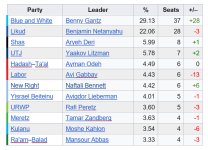The 2019 Israeli election may play out a bit differently. Trump's moving the embassy and recognizing the Golan Heights annexation gave Netanyahu a 4 or 5 seat boost in the polls. Here, Blue and White would do a bit better instead, and New Right (Naftali Bennett) would do much better. Union of Right Wing Parties (Smotrich and Ben Gvir) probably do a bit better, but it is also possible that the URWP doesn't form at all if Netanyahu thinks the US would get very angry at him putting it together.
The "New Right" Party of Naftali Bennett OTL fell just below the electoral threshold. The gist of the party was a mix of religious pro-settlement Zionism (with a rejection of race baiting, under a "if we want to annex everything from the river to the sea, it won't work without some kind of coexistence" vibe), libertarian economics, expanding the religious establishment to include modern orthodox (as opposed to the Haredi monopoly), and generic Likud policies on top. They'd probably prefer joining a Likud government, but Bennett also was personally friendly with Lapid.
Assuming that Likud gets 4.1% fewer votes (3% to Blue and White, 1.1% to New Right; plus .1% of URWP voters going to New Right because of strategic voting...)
April 2019 Israeli Knesset Election Results

Israeli politics is a mess and this is hardly an exact prediction.[*]
My guess is things go as follows:
First: Netanyahu gets 63 "recommendations" to form a government (Likud 28 + Shas 8 + UTJ 7 + New Right 6 + Yisrael Beiteinu 5 + URWP 5 + Kulanu 4 = 63 recommendations). Gantz gets 47 (Blue and White 37 + Labor 6 + Meretz 4). The Arab Parties don't recommend anybody. [**]
Second: Recommendation doesn't actually mean you form a government, it just means that the parties are voting for who they'd like to see
try and form a government. In theory, there are 63 right-wing seats for a Netanyahu Government. [***]
However, five of those seats belong to Avigdor Lieberman, a center-right arch-secularist who threw the country into a second round of election 2019 because he wanted to break the Ultra Orthodox's hold on the country's religious institutions. He demanded a unity government of Likud and Blue and White, and dogmatically rejected ever joining a government with Meretz in it. [****]
Third: Kulanu (Center-Right), Lieberman (Center-Right), and New Right (Right to Far Right, but weirdly pragmatic) maybe would be open to a Gantz government. If Netanyahu cannot form a government in two or three weeks, it goes to Gantz and Lapid.
Blue and White (37) + Labor (6) + New Right (6) + Yisrael Beiteinu (5) + Kulanu (4) = 58 Seats, which is still three short of a majority.
There was talk of New Right joining a Gantz government because of the personal friendship of Bennett and Lapid. This ultimately flowered into Lapid engineering the Bennett government. If Lieberman can be convinced to at least let a minority government form with Meretz's backing, then that's 62 seats to form a broad Centrist Government comprised of 58 members.
Plus, the coalition government would probably try very hard to coax some Likud members to switch parties and introduce legislation making it easier for people to defect from one party to another. The Bennett-Lapid Government tried to do this historically (although I don't remember if it actually passed). While a minority government would be a headache, lots of legislation can be passed with less than a parliamentary majority if certain parties (Meretz, Arab Parties) simply abstain from the vote. 58 Coalition MKs could routinely outvote a Bibi Bloc of 48 members.
On the other hand, Lieberman could also just be stubborn and throw the country into another round of elections.
 Avigdor Lieberman: Look at those crazy eyes.
Avigdor Lieberman: Look at those crazy eyes.
[**] Historically, it was 65 votes for Netanyahu and 45 votes for Gantz, based on the same alignment of parties as mentioned. The 10 Arab Party members didn't recommend anybody. After the September 2019 election, Blue and White tried to get Arab support - with three of the four Arab parties recommending Gantz.
[***] Also, despite Ben Gvir being part of The Union of Right Wing Parties, his party was sixth on the party list, so he doesn't actually get into the Knesset. Netanyahu is at his core a Nixon-like "pander far right then tack center right" sort of figure, and probably was hoping for that outcome when he engineered Ben Gvir's joining the far right electoral slate in 2019. It's a sign of how deranged and desperate he's become over time that he's let Ben Gvir rise so far. Ben Gvir probably has softened a bit in the name of trying to build broader appeal - in the same vein as folks like Marine Le Pen tacking semi-center and away from her father's much more over bigotry - but it's still nuts how much Netanyahu has tolerated Ben Gvir's rise.
[****] Ultimately in 2021 he did just that, but that was after two years of Bibi-induced chaos. Netanyahu was so insane that three huge red lines - Lieberman sitting with Meretz, antizionist Arab parties supporting a government from the opposition, and an Islamist party sitting in the government - all went out the window. That in 2021 Israel had an Islamist party in its governing coalition and named its first Arab Muslim Supreme Court Justice is one of those overlooked curiosities which really makes the post-2022 Ultra Right Netanyahu Coalition government look more insane by comparison.
There are also alternate scenarios where Gesher joins Blue and White (which they tried to do in April 2019) or Labor (which they did in September 2019) and/or Zehut drops out (which they did in September 2019 based on promises from Netanyahu). If Gesher joins another party or Zehut drops out, the outcome is roughly the same. If both happen, a simple majority could probably be comprised of 61 seats (Blue and White, Labor, Gesher, New Right, Yisrael Beiteinu, and Kulanu).
Most likely ensuring Roe V. Wade is still around
Something like Dobbs case could still happen. But, as Roberts pointed out, the framework for how to review abortion regulations *prior to some critical point* and the question of *when that critical point is* are two very separate questions. John Roberts in Dobbs seemed inclined towards narrowing Roe to the right to use the abortion pill in the first trimester. Arguably, that would make it consistent with the original "privacy" rationale, given the near impossibility of enforcing those laws without being very very invasive.
Whether or not Ginsburg retires in 2017 or 2018 is a big question. The GOP has at least 52 seats and maybe 54 (depending on whether a couple of close losses OTL are able to run "keep him honest" campaigns if it's clear Obama is going to beat Trump). If Ginsburg dies in September 2020 like OTL, the GOP will still stonewall her replacement. Odds are, the GOP will win the White House after twelve years of Democrat Presidents. If she retires in 2017 or 2018, Obama has to nominate somebody who (at a minimum) satisfies Graham, Collins, and Murkowski. There was J Michelle Childs OTL who Graham and Tim Scott lobbied for, but that was when there was a thin Democratic majority Senate.
Amy Coney Barrett wouldn't replace Ginsburg, since she wouldn't be a Court of Appeals Judge. Two other names considered for the Ginsburg Seat were Joan Larsen (Scalia Clerk,
US Court of Appeals Judge since 2017, big Justice Department undersecretary under Dubya, and Michigan Supreme Court Justice starting in 2015) and Barbara Lagoa (Florida Supreme Court Justice Starting in 2017,
US Court of Appeals Judge starting 2017, and Florida Court of Appeals Judge from 2006). Larsen is reportedly Roberts-like and Lagoa is reportedly Alito-like. My guess is Lagoa gets the nod if Desantis or Rubio is elected in 2020, and Larsen gets it if it is anybody else.
Supreme Court from 2017 to 2020 (No Ginsburg Retirement):
(3) Conservatives: John Roberts, Clarence Thomas, Samuel Alito
(1) Moderate Conservative: Anthony Kennedy
(3) Moderate Liberals: Stephen Breyer, Elena Kagan, Merrick Garland
(2) Liberals: Ruth Bader Ginsburg, Sonia Sotomayor
If 2005 to 2018 was the Kennedy Court OTL, 2017 to 2020 here will be the Ginsburg Court. As the Court's most senior liberal, she'll be controlling the assignment process in the controversial cases. Still, Breyer, Garland, or Kagan could play swing vote(s) in any number of cases. Usually this means religion or criminal procedure for those Justices.
Supreme Court from 2020 to 2021 (No Ginsburg Retirement):
(3) Conservatives: John Roberts, Clarence Thomas, Samuel Alito
(1) Moderate Conservative: Anthony Kennedy
(3) Moderate Liberals: Stephen Breyer, Elena Kagan, Merrick Garland
(1) Liberal: Sonia Sotomayor
Supreme Court from 2021 to 2022 (No Ginsburg Retirement):
(4) Conservatives: John Roberts, Clarence Thomas, Samuel Alito, Barbara Lagoa/Joan Larsen
(1) Moderate Conservative: Anthony Kennedy
(3) Moderate Liberals: Stephen Breyer, Elena Kagan, Merrick Garland
(1) Liberal: Sonia Sotomayor
Supreme Court from 2022 Onwards (No Ginsburg Retirement):
(5) Conservatives: John Roberts, Clarence Thomas, Samuel Alito, Barbara Lagoa/Joan Larsen, (CONSERVATIVE HERE)
(3) Moderate Liberals: Stephen Breyer, Elena Kagan, Merrick Garland
(1) Liberal: Sonia Sotomayor
Pretty much all of the people to replace Kennedy are Conservatives of either a Roberts bent or an Alito bent, with the exception of Gorsuch.
As far as COVID goes, I forgot to take into account the Supreme Court. The OSHA vaccine mandate would be upheld if Ginsburg retires. They would not be upheld if Ginsburg doesn't retire. The CDC eviction moratorium would be upheld.



